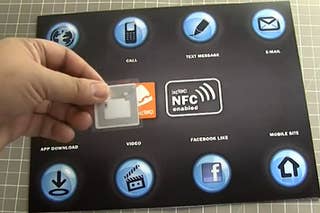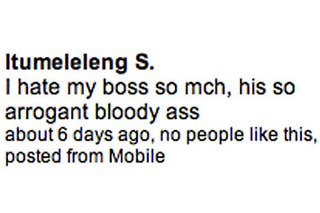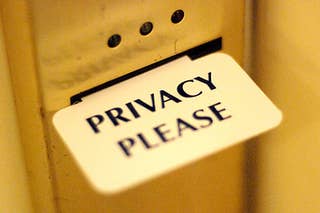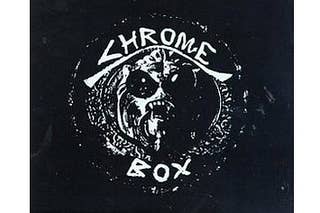
Musings on Anonymous Web Culture
Triple Canopy's June issue comes with an achingly serious appraisal of 4chan, Slashdot and the stranger corners of the anonymous web — a scene that's increasingly crowded out by social media. It's long, thoughtful, and (most importantly) quotes both a 19th century German sociologist and a Geekosystem commenter named "gofuckyourself." So, you know, diversity of sources.

What You'll Be Able To Do With The Next iPhone's New NFC Antenna
Word just leaked that the next generation of iPhones will come with a special kind of antenna, designed for something called Near-Field Communication. Here are the coolest things you'll be able to do with it.

The Internet's First Burn Book
It was only a matter of time. A UK developer has pulled together a site from the most embarassing and/or incriminating posts Facebook has to offer, including anything with the phrase "hate my boss" or "hungover." Odds are, they missed you — but it couldn't hurt to make sure. And maybe double-check your privacy settings.

Economists Are Taking Over the Game Industry
The game industry is hiring a new class of central bankers — but not in time to save Diablo III.

The World's Worst Social Network
On Storyboard, Katy Bolger takes a close look into what paper means in a prison. That means everything from envelopes of contraband to "kites," slips of paper passed from prisoner to prisoner as a kind of impromptu social network.

Google+ Users Being Total Dicks About The Twitter Outage
A lot of Twitter users flocked to Google+ to get through today's outage. Unfortunately, they weren't always welcome.

The Like Button Goes Mobile
Facebook just rolled out new developer tools that will let mobile and web apps add Like Buttons to their code. That means before too long, you may be able to Like Instagrams, Tweets or anything else you see on your phone. Not only is Facebook on nearly every page of the web, it's even integrating itself into other social networks too. A parallel internet indeed.

The First Extraterrestrial Reality Show Is Coming
Mars One wants to colonize the Red Planet. To make it happen, they're harnessing the power (and money) of reality TV.

You Can Now Turn On Your Lights By Tweeting
IFTTT (short for "if this then that") has been a power user secret for a while. It's a simple way to automate web tasks — like sending all your Instagram pictures to a Dropbox account, or texting you whenever someone posts a Stratocaster for sale on Craigslist. As of today, they're also working with Belkin's Wemo devices, which means that anything you plug in can be turned on via email, SMS and Twitter, or timed to flick on whenever the sun sets. Use these new powers only for good.

Beautiful Art, Created With Code
The programming language Processing is being used to create computer art for everyone from Radiohead to the New York Times. We talked with one of its creators about the programming art renaissance, and what's in store for Processing 2.0.
What Online Tracking Looks Like In Real Time
A Firefox plug-in called Collusion maps third parties tracking you online, as you browse. Below is what happens every time you visit a new website.

The Old-Web Guru With A Plan To Save The Middle Class
Jaron Lanier invented virtual reality. Now he wants to totally change the web by letting you make money off your personal data.

Making Art From Video Game Landscapes
As videogame graphics improve, a new crop of artists is making photographic landscape art out of virtual levels. And it's not as uncanny as you think.

Why "Do Not Track" Does Not Mean Do Not Track
All week, Microsoft and Mozilla have been trading punches over something called "Do Not Track," a browser setting that's supposed to be the next big thing in online privacy. Here's what it is and why it matters.

Facebook Is Testing Facebook For Kids Under 13
The system would attach kids' profiles to their parents (Mom!) and let them charge parents for games and media. Of course, there are already plenty of pre-teens on Facebook — but since there's a federal law against collecting data from children without parental consent, having a system like this lets Facebook save face if they ever go to court over it. And since it's likely to be in testing for a good long while, they don't have to worry about making kids use the G-rated version of Facebook after they've been on the real thing.

How Three Hard Drive Companies Gobbled Up The Industry
We've gone from nearly a dozen scrappy hard drive companies to three huge ones. This is what happens when a product stops being cutting edge, and becomes just one more component. (See also: LCD panels and flash storage.)

14 Google Products That Are Also Metal Bands
Strangely, "Crisis Response" is not one of them.

Mining VHS Tapes For Internet Gold
Everything Is Terrible! loves the internet and hates nostalgia. An interview with the web's premiere VHS archeologists.

The First Website You Ever Visited
We took an office poll of the first websites Buzzfeeders ever visited — from Geocities to multi-user online dungeons. What's the first website you ever visited?

The iPhone's First "Real World" Camera Filter
It's the iPhone's first "real world" camera filter app. InstaCRT displays your picture to a black-and-white CRT monitor in Stockholm, takes a photo of your picture on the monitor and sends back the beautifully grainy result. Confused? Check out the video demonstration. (via)

